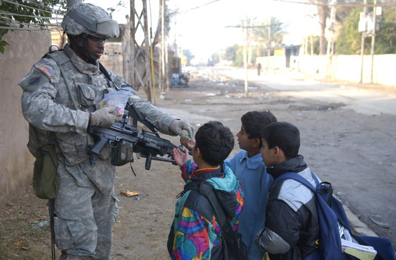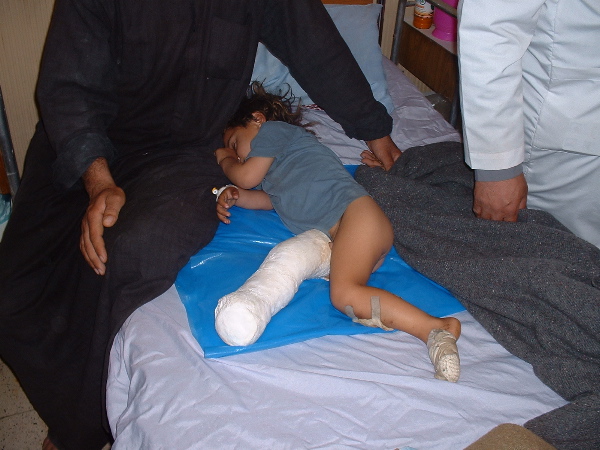Posted on May 30th, 2008 at 2:37 pm by Steve
Compare and contrast, words vs. deeds:
Words:

The United Nations’ most recent human rights report on Iraq recorded 88 civilian deaths caused by U.S. airstrikes during the March-through-June period last year [2007]. It urged the U.S. to pursue a “vigorous” investigation of the events leading to the deaths.
Asked whether the request had led to changes, Air Force Brig. Gen. Burt Field said, “No, I’m afraid not, and the reason is that we are doing everything humanly possible to avoid the death of innocent people.”
Among the weapons in use, he said, were 500-pound guided missiles intended to create extremely targeted explosions. “One of the bombs we are using has been dubbed the ‘Martha Stewart Bomb’ because you can drop it, and it will blow up a house and not even touch the buildings to the left or the right,” Field said.
Maj. Gen. David Edgington, the top Air Force commander in Iraq, said the military ensures that each airstrike meets rules in place to minimize civilian casualties. Factors considered include building materials, civilian schedules in the area and intelligence, he said.
“It’s a very scientific process,” he said.
“We make these analyses on every bomb we’re going to drop and make sure it falls within the criteria” to keep harm to civilians low. “We can pretty much guarantee one bomb for one target.”
Source: Los Angeles Times, February 6, 2008
Deeds:

Diplomats from 111 nations formally adopted a landmark treaty banning cluster bombs on Friday after futile calls for participation by the weapons’ biggest makers and users, particularly the United States.
Source: Associated Press, via Yahoo News, May 30, 2008
Cluster bombs, which nearly 100 countries are seeking to ban, should not be considered bad as long as states involved in conflicts use them responsibly, a senior United States official said on Wednesday.
The official, who declined to be identified, also told a background briefing that Washington was planning to create a “quick reaction force”, or QRF, to handle threats to civilians from remnants of war, like cluster bombs.
The official’s remarks, which could not be quoted directly, clearly confirmed that Washington — like Russia, China and some other powers — remained opposed to banning the weapon.
Source: Reuters, January 16, 2008
WASHINGTON, Aug. 10 — Israel has asked the Bush administration to speed delivery of short-range antipersonnel rockets armed with cluster munitions, which it could use to strike Hezbollah missile sites in Lebanon, two American officials said Thursday.
The request for M-26 artillery rockets, which are fired in barrages and carry hundreds of grenade-like bomblets that scatter and explode over a broad area, is likely to be approved shortly, along with other arms, a senior official said.
[…]
The United States had approved the sale of M-26’s to Israel some time ago, but the weapons had not yet been delivered when the crisis in Lebanon erupted. If the shipment is approved, Israel may be told that it must be especially careful about firing the rockets into populated areas, the senior official said.
Source: New York Times, August 11, 2006
“What we did was insane and monstrous, we covered entire towns in cluster bombs,” the head of an IDF [Israeli Defense Forces] rocket unit in Lebanon said regarding the use of cluster bombs and phosphorous shells during the war.
Quoting his battalion commander, the rocket unit head stated that the IDF fired around 1,800 cluster bombs, containing over 1.2 million cluster bomblets.
In addition, soldiers in IDF artillery units testified that the army used phosphorous shells during the war, widely forbidden by international law. According to their claims, the vast majority of said explosive ordinance was fired in the final 10 days of the war.
Source: Ha’aretz, September 12, 2006
Landmines and cluster munitions are continuing to kill and injure between three and four civilians in Lebanon each day, a campaign group has said.
Landmine Action is calling for an international ban on the weapons.
The UN estimates that there may be as many as one million unexploded cluster bomblets in south Lebanon, fired by Israel during the month-long conflict.
Source: BBC News, October 20, 2006